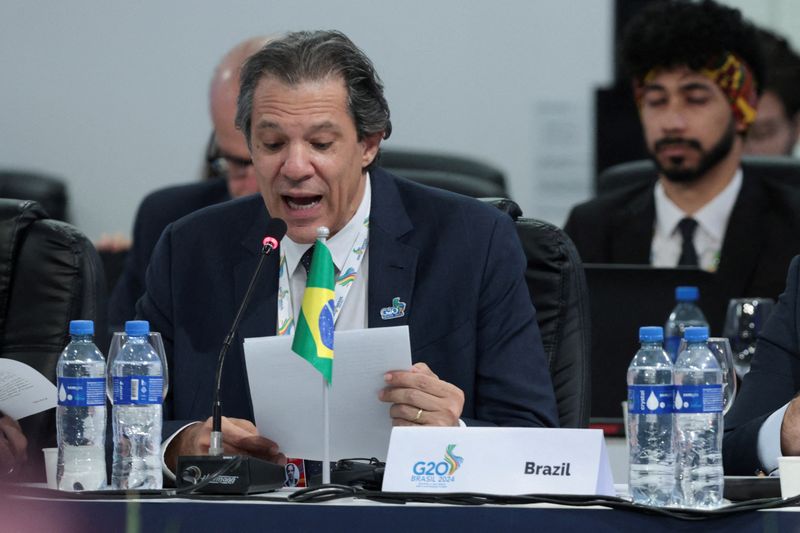By Marcela Ayres and Andrea Shalal
WASHINGTON (Reuters) -Brazil's proposal to tax the super-rich globally gained momentum among Group of Twenty members on Wednesday, with France's finance minister and the head of the International Monetary Fund backing a coordinated push to generate new revenue and build a better common future.
Brazilian Finance Minister Fernando Haddad said Brazil, current president of the Group of Twenty (G20), was aiming to build international consensus on the taxation of wealth this year, and would push for a joint declaration at a meeting of G20 finance ministers and central bankers in July.
"The G20 declaration that we are going to propose aims to politically back these initiatives," he told an event during the spring meetings of the IMF and the World Bank, underscoring the importance of winning support from the biggest economies.
His French counterpart Bruno le Maire, who had already expressed support for the Brazilian proposal, told the event that moving to tax the rich was the logical next step for a series of global taxation reforms launched in 2017, including agreement on a global corporate minimum tax. He said the G20 should aim to reach an agreement on taxing the rich by 2027.
Le Maire said any proposal should be based on the best practices of the Organization for Economic Cooperation and Development to ensure trust in the evolving system.
IMF chief Kristalina Georgieva said closing tax loopholes and ensuring that the richest paid their fair share would mobilize funds urgently needed for sustainable and inclusive growth.
She said IMF research showed that ending tax avoidance by corporations could generate an additional $200 billion a year in revenue, while implementation of a global corporate minimum tax would result in an additional $150 billion. The IMF also estimated that setting a minimum floor for carbon pricing could boost revenue by $1.4 trillion a year, she said.
"When policymakers have the will, there is a way, and we have put out what the way is," she said.
Haddad told Reuters that Wednesday's G20 working dinner would discuss how using funds raised through the new taxes could address combating hunger and the green transition.
He said Nobel Prize-winning economist Esther Duflo would take part in the dinner, along with Gabriel Zucman, director of the European Tax Observatory, who is compiling a report on the matter in time for the next G20 finance track meeting in July.
"If we can achieve consensus on this by the end of the year, it's such an extraordinary thing ... it's historic," he said.
Zucman has proposed that very-high-net-worth individuals - some 3,000 people in the world who have at least $1 billion in assets - pay at least the equivalent of 2% of their wealth in income tax each year. That would generate $250 billion per year - half of the annual revenue projected as necessary for developing countries to address climate change challenges, he said.
Joseph Stiglitz, another Nobel Prize-winning economist, told a separate event that climate change and inequality are global problems and need to be addressed on a global agenda.
Taxing the rich also made sense because that was where the money was. "You can't squeeze money out of the poor, and the bottom 50% don't have any money," he said.
"We need to establish new norms where the very wealthy contribute their fair share," he said. "The notion that society has to have a certain minimum level of fairness and equity is truly important for social cohesion and the functioning of democracy."
Duflo told the same event that one critical reason to support taxation of the rich was that people in poor and developing countries were dying due to climate change, largely driven by the consumption patterns of richer nations.

"I'm very confident that the taxation of the billionaires will happen at some point," she said. "It might not be at this very moment, it's a journey."
Susana Ruiz Rodriguez, regional tax coordinator for Oxfam, said it was the first time that taxing the super-rich was being discussed at the IMF-World meetings, although 2% was a very modest target. Oxfam estimates that an annual wealth tax of more than 8% across all countries would have been needed to keep billionaires' wealth constant over the last two decades.